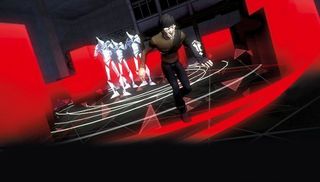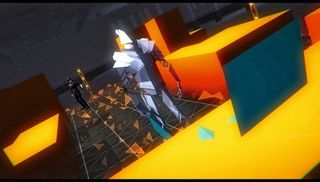Volume first-look: a cyberpunk stealth sim inspired by Robin Hood

"He's a Let's Player of crime.” Volume's protagonist is a young man who stumbles across a futuristic training simulator: an ad-hoc assemblage of projectors that can transform the game's single room into innumerable glowing neon stealth challenges. The simulator's previous owner used it to plan a coup that has subsequently overthrown the government. Now, Volume's hero uses it to broadcast the secrets of the powerful to a cowed populace. Each simulation represents a real place, and every transmission demonstrates the best way to rob the rich and give to the poor.
Volume is a cyberpunk retelling of Robin Hood, and its creator has created a philanthropic thief who is part gaming YouTuber and part WikiLeaks activist. “Robin Hood was always done as a contemporary hero,” says developer Mike Bithell. “Like Spider-Man. He always existed in the time period that he was being talked about.”
The player negotiates maze-like environments from a top-down perspective. The way you gather glowing gems to reveal the exit is an abstraction that nods at the stealth genre's inheritance from Pac-Man, and the use of vision cones to denote the areas of awareness of each stage's patrolling robot guards recalls Metal Gear Solid.

In the first version of the Robin Hood story, the outlaw wasn't an archer but a bugler – his chief superpower, as Bithell puts it, being to blow a trumpet in order to summon his mates to his aid. In Volume, the Bugle is a wrist-mounted gadget that enables you to fire a bouncing projectile that can be triggered to produce a sound at any point along its trajectory. Any guards in its radius will move to investigate, and using the Bugle to manipulate patrol routes and shift static sentries is key to negotiating each level.
Other gadgets include the Veil – a cloaking device – and the Thunderclap, a deafening blast that temporarily reduces the effective radius of sound in general. There are also environmental objects to manipulate: lockers to hide in, forcefields to disable and alarms to circumvent. “I'm trying to do stealth in a very fast way, and a very binary way,” Bithell says. “I don't like the ambiguity that has crept into stealth games. I like stealth where you can look at a screenshot and know exactly where everyone is and what is going on.”
Bithell also cites Super Meat Boy as an inspiration, and the influence of Edmund McMillen's world-class platformer is apparent in the way that Volume emphasises trial-and-error. There's a little of Hotline Miami, too, in the way that tough levels feel like threading a needle through a mass of barbed wire.

That said, Bithell has made a deliberate decision to remove violence. “That's not the great liberal objective that a lot of people have read it as. It's a mechanical thing – stealth games are unbalanced if you can kill people. When I play Metal Gear Solid, my objective isn't to escape – it's to snap the necks of everybody in the room. I end up with a bag of awesome gadgets that I never use, because I've got this one winning strategy.”
The biggest gaming news, reviews and hardware deals
Keep up to date with the most important stories and the best deals, as picked by the PC Gamer team.
It's a step towards making a stealth game that allows for arcade-style mastery, and this hooks into the in-game level creator that enables players to make and share challenges for their friends to crack.
The narrative takes the form of a conversation between Loxley – played by YouTuber Charlie McDonnell – and his AI assistant, played by Danny Wallace.Wallace's character is a nod to Bithell's previous game, Thomas Was Alone, and as in that game the story will be told entirely through voiceover.

“We lose some stuff in terms of tying story to the world,” Bithell says, “but it means we can tell the story regardless of the level being played – so we can use usergenerated content as part of the narrative.” As Loxley streams his attempts, he'll also be contacted by viewers and come into contact with an antagonist who seeks to shut him down. These are the agents of the game's take on Prince John, and as the player progresses they'll get closer and closer to tracking down Loxley's broadcasting location.
It's a clever storytelling decision, not least because it allows player failure to be incorporated into the story. Loxley is never really caught, and never really dies – but the people he's trying to help watch him stumble, and comment on it.
If nothing else, this is something that Bithell's experience after the success of Thomas Was Alone has prepared him for. I speak to him just after he's spent a morning fending off a wave of hate-filled Twitter spam, having innocently expressed an interest in receiving more constructive criticism from his players.
“Volume is a little bit autobiographical. In the last year I've learned to deal with being a person who is visible on the internet.”
Joining in 2011, Chris made his start with PC Gamer turning beautiful trees into magazines, first as a writer and later as deputy editor. Once PCG's reluctant MMO champion , his discovery of Dota 2 in 2012 led him to much darker, stranger places. In 2015, Chris became the editor of PC Gamer Pro, overseeing our online coverage of competitive gaming and esports. He left in 2017, and can be now found making games and recording the Crate & Crowbar podcast.
Most Popular

